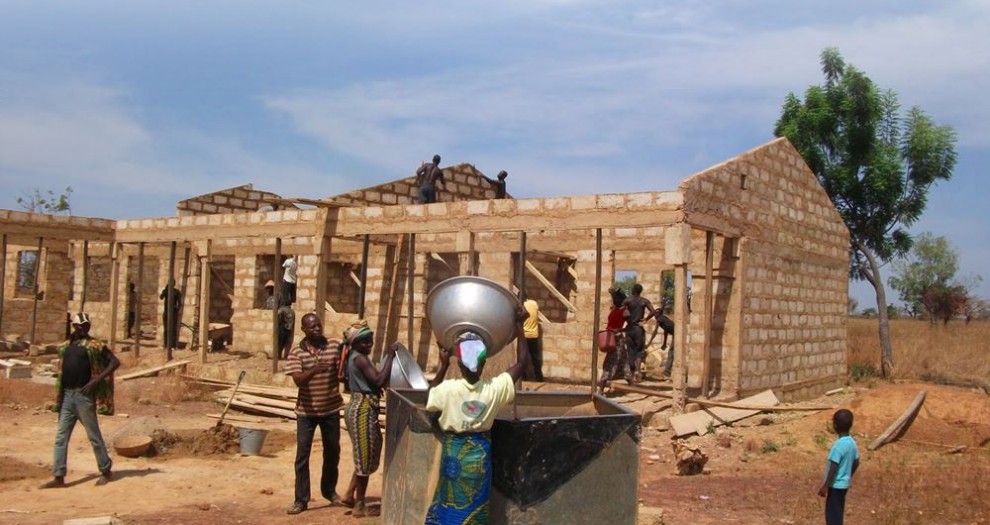Welcome to the online version of our Spring 2013 Newsletter. In this newsletter:
- A school for everyone
- A new school in Mettoh
- A visit to Mettoh, September 2012
- Alfred Sogsou
- A first visit to Bagri School
- A message from a VSO education worker
- Bereavement at Gberi
A school for everyone
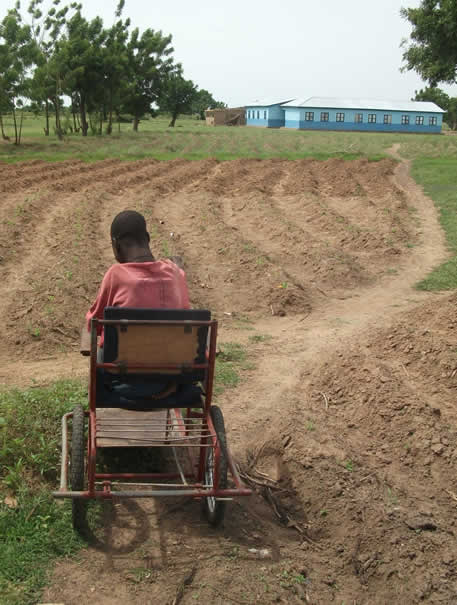
Beri Banguu sits outside his house in Gberi village and looks at his new school across the grassland. Severely disabled from birth, he once spent his days crawling in the dirt — with little hope for the future.
When the school was built in Beri’s village our Programme Manager visited his home to talk to his parents. Beri was thrilled: he had not dared to believe that the school was being built for him. Now he attends everyday and we have been able to provide a wheelchair too.
One of our key principles is that our schools should be for everyone, no matter how poor, no matter how disabled. The story of Beri is told in our film, The Children of Savannah.
A new school rises from the savannah in Mettoh
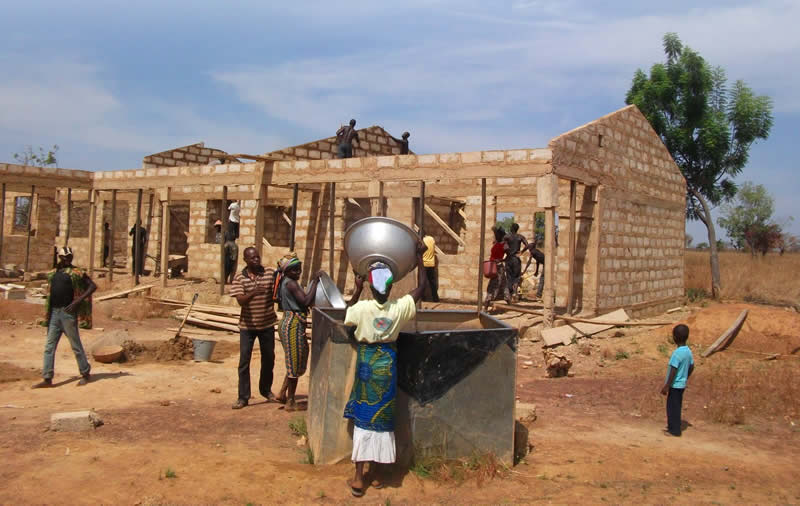
In northern Ghana, the fierce rains of the summer – which almost daily drench the savannah – give way, from October, to an increasing heat. The temperature continues to rise, reaching a scorching crescendo in March and April. This is a harsh climate, and the only respite from the relentless sun in the dry, hungry months is the choking, dusty harmattan winds which sweep south from the Sahara.
Throughout the seasons – with their varying challenges for labourers – building work has continued at Mettoh. As with all of our school buildings, much of the building work has been undertaken by the villagers. The work was relatively far advanced when we visited in September 2012 (see article below). By March 2013, the main structure was virtually complete, with the final touches being applied to the roof. The staff in Ghana provide us with a fascinating daily diary of their activities. The extracts below give a flavour of the challenges of the building work at Mettoh – which of course needed to be managed alongside the continuing programmes at the other three Savannah schools:
5 August 2012: “We continued at Mettoh with carpentry work on the lintel of three classrooms blocks. (Note there are three blocks put together in a ‘u’ form). The footing of the kitchen was also built.”
22 August 2012: “The day did not end successfully because the place was full of scorpions and one of the labourers had a scorpion sting. Work slowed down because the other labourers were careful while working.”
19 September 2012: “We went to Mettoh with the carpenters to work on the beams which is our major area of work now – notwithstanding the weather which was not good. The rain soon set in again and we ran into a nearby house. It rained shortly and stopped then we continued work. By then Pastor Charles Karbo had gone to Ghana Education Service Office for a meeting about starting the school at Mettoh. Alfred Sogsou was also to go to Pavuu to supervise delivery of sand which we asked to be fetched for the kitchen work to continue. The rain started again. It was very, very difficult to go back to Mettoh to pick up the carpenters, because the whole road was flooded. At the time that the rain was seriously raining Adams and Thomas [other Savannah workers] had finished with their usual rounds.”
24 October 2012: “We were in the office to work. Later in the day Alfred alerted the building committee at Mettoh that we would be coming to complete the concrete work on the beams.”
17 December 2012: “We went to Mettoh to complete the school block and it is now ready for roofing to begin.”
21 December 2012: “We went to Mettoh to supervise the moulding of blocks for the kitchen.”
22 February 2013: “Still in Mettoh, we tried to bind all the beams to the walls and put on the fascia boards. We were then ready to put the sheets on, which we hope to begin on Monday.”
15 March 2013: “On Friday the carpenters completed the roofing work.”
A visit to Mettoh, September 2012
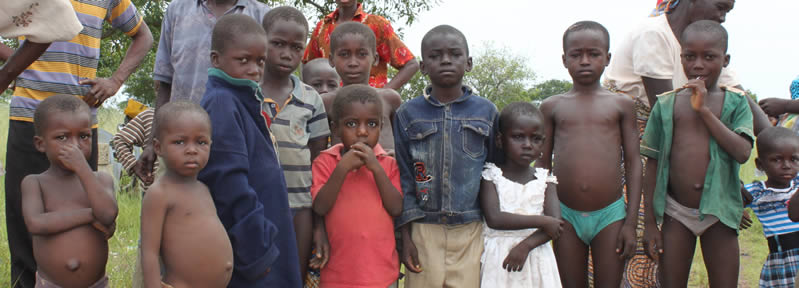
A number of trustees visited Ghana in September 2012, and we were again grateful for the kind provision of a donation specifically to cover the cost of the visit.
We arrived in Mettoh by truck and pulled off the road through the long grass to the building site. The borehole was already in place, and being used by one of the local women to wash clothes, one of the many community benefits of a Savannah school being built in the village. We walked over to the main building to see what progress had been made on the construction of the school. Walls and lintels were up but there was much more to do. As we turned to come away, a growing crowd of local people was gathering: parents, children, young men, grandparents and young babies in slings on their mother’s backs. Word had been sent that we were in the area, and a large number of the local community had come out to meet us.
Many of the children were dressed in ragged clothes and had distended stomachs. Some were suffering from skin and bone diseases, and were less able to get along. All were extremely excited to have a school coming to their village, something that they had wanted for a long time. There were children clambering over the piles of sand and soil on the site, and then a large group went over to the building and we helped them clamber up on to the windowsills for a picture. As we lifted them up we noticed that many of them were nothing more than skin and bone.
The local village chief then joined the crowd. Pastor Charles Karbo, our Programme Manager in Ghana, gathered all the people together and invited the local chief to make a speech, which he made in Dagaare, the native language, interpreted for us into English by Pastor Charles Karbo. The chief welcomed us to Mettoh and said that the village had waited many years for this day. He added ‘that the village never imagined that they would have a school and yet now here it is before their eyes’.
On behalf of the whole village he thanked Savannah supporters for making this possible.
There were then short speeches from Pastor Charles Karbo and from the trustees. Pastor Charles thanked everyone for their welcome and expressed warm appreciation to the village chief for making the land available to build the school.
This was a special occasion, with the coming together of all parties concerned in the building of Mettoh school. We are most thankful to the Lord for the provision of this fourth school, and pray that it will be to the benefit of the local community as these children are able to come together each day to learn, and as they grow up in this region where life can be a daily struggle.
Alfred Sogsou
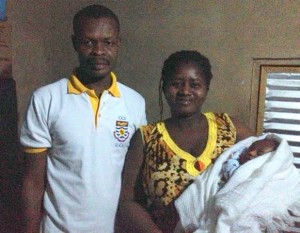
Supporters will know the name of Alfred Sogsou – a loyal worker from the earliest days of Savannah, and who works closely with Charles Karbo in running our programmes. Alfred prepares the accounts which we receive each month.
In December, he and his wife had their first child – a boy called Alan. After a difficult birth, Alfred’s wife was in the regional hospital some 60 miles away in Wa. Travelling on his motorbike to Wa he hit a pothole on the hazardous road and fractured a bone in his leg.
Thankfully he is now much better and able to return to work again.
A first visit to Bagri School
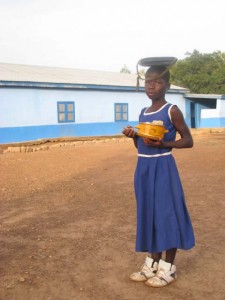
The following is a reflection of the first visit to Bagri of our new trustee during his visit to northern Ghana in October 2012:
“We visited the school at Bagri, arriving just before the day started under a beautiful blue sky, with the temperature already rising. All the children were gathered in the front quadrangle, standing in class lines waiting for the Headteacher to address them before going to their classrooms. Each child was smartly dressed in the Savannah uniform, and carried a container ready for the meal later in the day. At the sound of the drum, all turned and marched into school to begin the day.
The classrooms were lively with energetic children, keen to learn and ready for the day. We spent time in the classrooms, visiting the Kindergarten, the Primary School and the relatively new Junior High School (JHS) all of which are on the same site as this, the first and therefore most developed Savannah school. At lunchtime, we watched as the children ate their lunch, a simple meal of rice, cooked on site by the staff, and drank water from the borehole. The children were fit and happy, a regular meal clearly making a difference to their health and wellbeing.
I was very struck by the very real contrasts between those villages with and those without a Savannah school.”
A message from a VSO education worker
Lawra District often has assistance from a British VSO volunteer with education experience. The most recent volunteer, Sarah Gardner, wrote to us on her return from spending a year in Ghana.
“Savannah Education Trust do such wonderful things here. I have worked closely with Bagri Baptist School and been extremely impressed with the work that goes on there. You seem to have found a way to motivate your teachers, which makes a huge difference to the children they are educating.”
Bereavement at Gberi
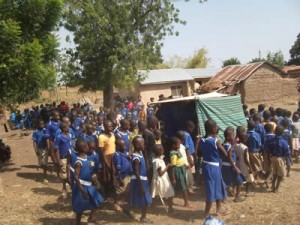
It was with a great sense of sadness that we heard at the start of December that one of the pupils at Gberi School died after a long illness. Her name was Wuur Lenmwe and the funeral in the village was attended by many of the staff and pupils. We pray for them and for her family.
The bereavement is a reminder that we work in a desperately poor part of the world, where illness and death are never far away. Our hope and prayer is that an education will in due course alleviate the worst of the poverty. But we are also aware that, however effective an education, it will never fully remove all suffering.

